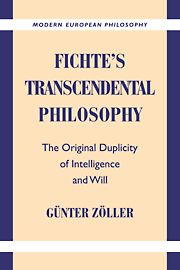Book contents
- Frontmatter
- Contents
- Acknowledgments
- Method of Citation for Fichte's and Kant's Works
- Key to Fichte's Works Cited
- Introduction
- Part I Thinking about Thinking
- Part II Knowing and Doing
- Part III Thinking and Willing
- Part IV Pure Willing
- 7 Determination to Self-determination
- 8 The Unity of Intelligence and Will
- Notes
- Bibliography
- Index
8 - The Unity of Intelligence and Will
Published online by Cambridge University Press: 05 June 2012
- Frontmatter
- Contents
- Acknowledgments
- Method of Citation for Fichte's and Kant's Works
- Key to Fichte's Works Cited
- Introduction
- Part I Thinking about Thinking
- Part II Knowing and Doing
- Part III Thinking and Willing
- Part IV Pure Willing
- 7 Determination to Self-determination
- 8 The Unity of Intelligence and Will
- Notes
- Bibliography
- Index
Summary
In a radical extension of Kant's intents and achievements, transcendental philosophy in Fichte aims at a systematically integrated account of the principal conditions governing human consciousness and its objects. The intended integration concerns equally the conditioning structure of consciousness and that of its correlated worlds, thus resulting in complementary transcendental theories of subjectivity and objectivity. For Fichte the structural integration of self and world does not take the form of a reduction to some simple origin. Rather, the manifest complexity of consciousness and its objects is retained even at the level of their principal conditions. The origin is complex rather than simple, albeit of the fundamental complexity of two principal conditions that stand in a relation of “original duplicity.” In the transcendental theory of the subject the original duplicity is that of thinking and willing. In the transcendental theory of objects it is that of the world of experience and the world of freedom.
Yet their original duplicity notwithstanding, intelligence and will as well as their correlated worlds remain intimately linked and exhibit genuine unity amid all principal differentiations. To be sure, the unity in question is not that of an identical origin in some undifferentiated primal stratum of either self or world. Instead, it is the unity of a functioning whole; the self and its worlds are united in the teleological perspective of their essential cooperation. The original duplicity is at the same time an original complicity.
- Type
- Chapter
- Information
- Fichte's Transcendental PhilosophyThe Original Duplicity of Intelligence and Will, pp. 110 - 126Publisher: Cambridge University PressPrint publication year: 1998



